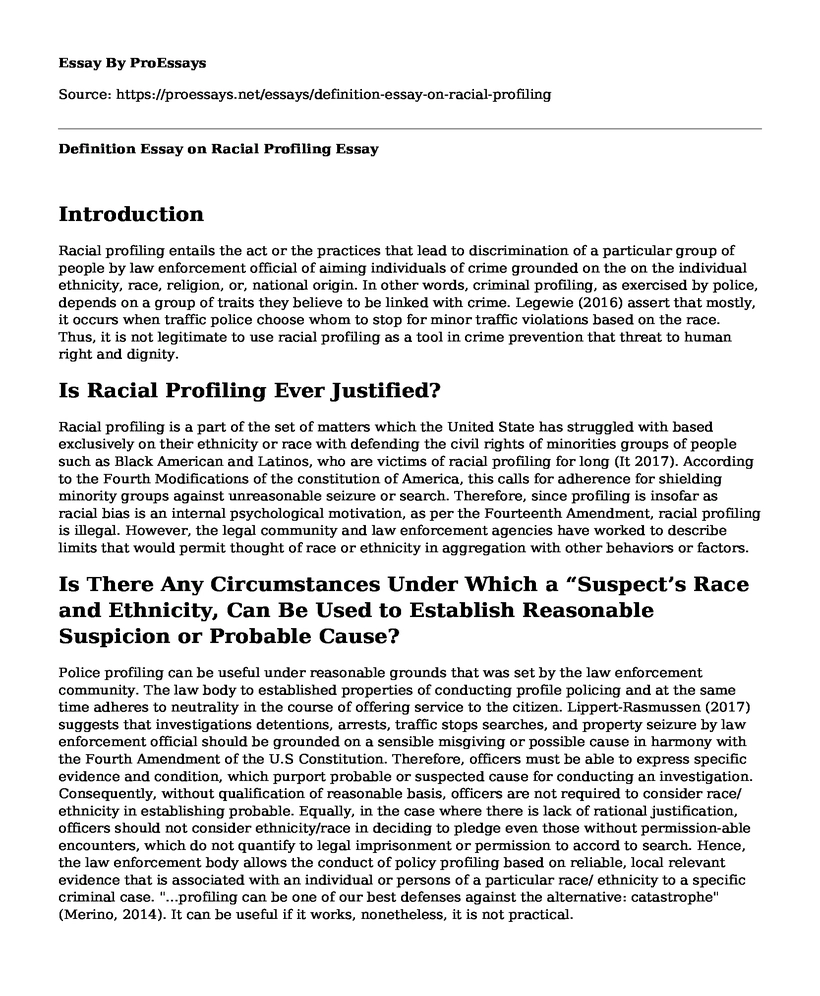Introduction
Racial profiling entails the act or the practices that lead to discrimination of a particular group of people by law enforcement official of aiming individuals of crime grounded on the on the individual ethnicity, race, religion, or, national origin. In other words, criminal profiling, as exercised by police, depends on a group of traits they believe to be linked with crime. Legewie (2016) assert that mostly, it occurs when traffic police choose whom to stop for minor traffic violations based on the race. Thus, it is not legitimate to use racial profiling as a tool in crime prevention that threat to human right and dignity.
Is Racial Profiling Ever Justified?
Racial profiling is a part of the set of matters which the United State has struggled with based exclusively on their ethnicity or race with defending the civil rights of minorities groups of people such as Black American and Latinos, who are victims of racial profiling for long (It 2017). According to the Fourth Modifications of the constitution of America, this calls for adherence for shielding minority groups against unreasonable seizure or search. Therefore, since profiling is insofar as racial bias is an internal psychological motivation, as per the Fourteenth Amendment, racial profiling is illegal. However, the legal community and law enforcement agencies have worked to describe limits that would permit thought of race or ethnicity in aggregation with other behaviors or factors.
Is There Any Circumstances Under Which a “Suspect’s Race and Ethnicity, Can Be Used to Establish Reasonable Suspicion or Probable Cause?
Police profiling can be useful under reasonable grounds that was set by the law enforcement community. The law body to established properties of conducting profile policing and at the same time adheres to neutrality in the course of offering service to the citizen. Lippert-Rasmussen (2017) suggests that investigations detentions, arrests, traffic stops searches, and property seizure by law enforcement official should be grounded on a sensible misgiving or possible cause in harmony with the Fourth Amendment of the U.S Constitution. Therefore, officers must be able to express specific evidence and condition, which purport probable or suspected cause for conducting an investigation. Consequently, without qualification of reasonable basis, officers are not required to consider race/ ethnicity in establishing probable. Equally, in the case where there is lack of rational justification, officers should not consider ethnicity/race in deciding to pledge even those without permission-able encounters, which do not quantify to legal imprisonment or permission to accord to search. Hence, the law enforcement body allows the conduct of policy profiling based on reliable, local relevant evidence that is associated with an individual or persons of a particular race/ ethnicity to a specific criminal case. "...profiling can be one of our best defenses against the alternative: catastrophe" (Merino, 2014). It can be useful if it works, nonetheless, it is not practical.
Should the Law Always Be “Color Blind”?
All the circumstances under which racial profiling is concerned it has proven that there is lack of neutrality due to the power imbalance between law enforcement community, who are often members of the majority population, and, the driving force of the implementation, who is composed of a minority population. Those who advocate profiling claim that it provides law enforcement official with a useful tool during an investigation, while the opponents point that it is counterproductive and is an essential violation of core American morals of human right and dignity. However, since it is difficult to determine whether a police practicing racial profiling has an evil or good intention, therefore, the law should further set gauge to determine the intention of racial profiling to make it practical.
References
It, S. (2017). Legal Punishment as Civil Ritual: Making Cultural Sense of Harsh Punishment. ECI Interdisciplinary Journal for Legal and Social Policy, 4(1), 2.
Legewie, J. (2016). Racial profiling and use of force in police stops: How local events trigger periods of increased discrimination. American journal of sociology, 122(2), 379-424.
Lippert-Rasmussen, K. (Ed.). (2017). The Routledge handbook of the ethics of discrimination. Routledge.
Merino, N. (Ed.). (2014). Racial Profiling. Greenhaven Publishing LLC.
Cite this page
Definition Essay on Racial Profiling. (2022, Mar 24). Retrieved from https://proessays.net/essays/definition-essay-on-racial-profiling
If you are the original author of this essay and no longer wish to have it published on the ProEssays website, please click below to request its removal:
- Different Types of Existing Child Abuse in the Society
- All-Hazards Approach to Emergency Preparedness Paper Example
- Essay Sample on Qualities That Make Rudo Mazorodze a Great Leader
- Essay Sample on Sneak and Peak Warrant: Combatting Terrorism & Crime
- Essay on Scarcity: Why Having Too Little Means so Much by Professors Mullainathan & Shafir
- Essay Example on Technology Addiction: How Far Is Too Far?
- Paper Example on Uprooting White Supremacy Culture: Ensuring Racial Equity in Schools







